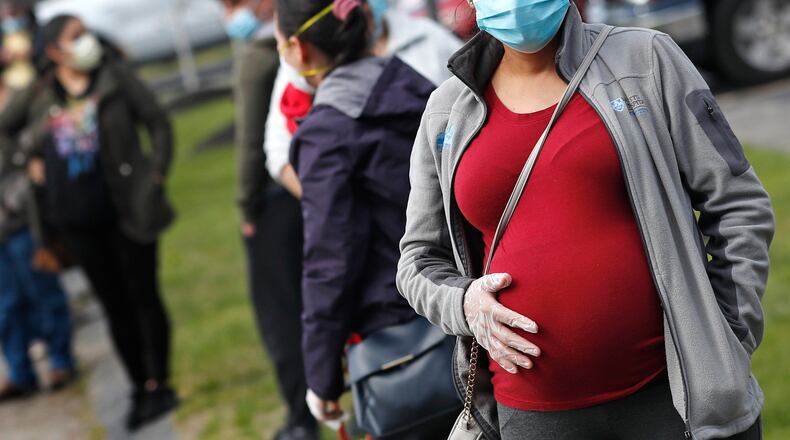In light of these rare but tragic cases, obstetric professionals are concerned that many pregnant women are not getting vaccinated against COVID-19.
While more than 70% of U.S. adults have received at least one dose of a coronavirus vaccine, only about 35 percent of pregnant women nationally are vaccinated, according to the latest data from the Centers for Disease Control and Prevention. The vaccine can prevent serious illness, but also prevents the likelihood of hospitalization and death as a result of the virus.
Dr. Yamini Teegala, chief medical officer of Rocking Horse in Springfield, said that the medical center recommends vaccination against COVID-19 to all pregnant and lactating people.
“There is growing evidence that if a pregnant woman gets infected with COVID, not only are they at an increased risk for severe illness, but also there is an increased risk of preterm and stillbirth,” she said.
Beavercreek resident Jess Welz had a baby two months ago. The 27-year-old nurse who works in labor and delivery got two coronavirus vaccine doses during pregnancy and a booster shot recently after giving birth. Welz got vaccinated because she was more concerned about the risk of getting severe COVID-19 and resulting complications during pregnancy than she was about any rare negative side effect of the vaccine.
Dr. Shawn Osterholt, who works as an OB/GYN through Mercy Health in Springfield, said he has seen “great vaccination hesitancy” among his pregnant patients in regard to the COVID-19 vaccine, with some patients voicing fear of long-term complications that could arise from the immunization for themselves and for their infant.
The OB/GYN said that he tells his patients “on a daily basis,” however, that the risks of contracting the virus outweigh any risks associated with vaccination.
The risks of a healthy pregnant woman getting severe COVID-19 are low, but the chance is higher when compared to people who are not pregnant. For pregnant women who contract severe COVID-19, they are at increased risk of complications before and after birth.
“Pregnant women are at a higher risk than the general population for moderate and severe disease,” Osterholt said. “They’re at more risk of severe COVID, more risk of hospitalization, more risk of incubation, higher risk of death.”
A recently released CDC study found that while overall still rare, pregnant women with COVID-19 face an increased risk of stillbirths compared with uninfected women, and that risk rose to four times higher after the Delta variant emerged.
Miami Valley Hospital was one of 33 hospitals that collected data for a study this year finding that pregnant patients with severe to critical COVID-19 symptoms were at higher risk than mild and asymptomatic coronavirus patients for high blood pressure disorders like preeclampsia, cesarean births and needing to give birth early.
Vaccinated people who have a breakthrough case are more likely to be asymptomatic. McKenna said he has not seen a vaccinated mom with COVID-19 experience complications; it has all been unvaccinated moms.
Dr. Robert Fresch has seen the impact putting a pregnant mother with severe COVID-19 on life support has on the entire family. Before coming to Kettering Medical Center to work as a maternal fetal medicine attending physician, he worked at a Cincinnati unit specializing in life-support care.
"I had a case where a mom was in respiratory failure and she was at 25 weeks gestation of her pregnancy and she was intubated and on the ventilator," he said. "I watched a husband try to decide between what to do for care for his unborn child and his wife who's on the ventilator. ... Fortunately for this case, with (life support) we were able to get this mother out to approximately 28 to 29 weeks of pregnancy before we ended up having to move forward with a delivery for preeclampsia."
Reporter Sydney Dawes contributed to this story.
